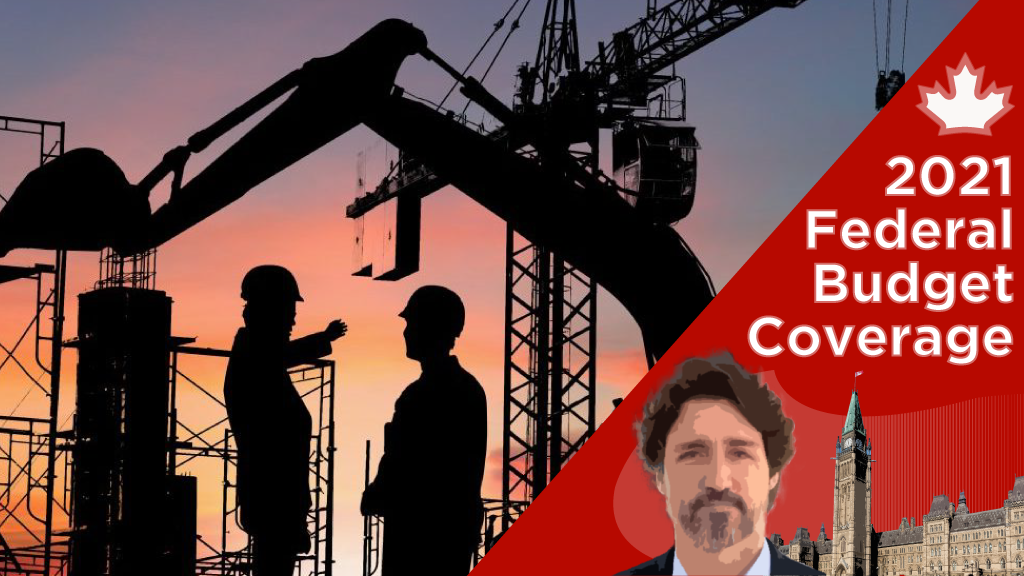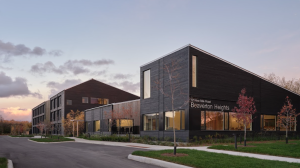Federal Finance Minister Chrystia Freeland’s first budget, released in the House of Commons today, contains significant new pledges to expand affordable housing, fund home retrofits, invest in a green recovery and kick-start the National Trade Corridors Fund.
Freeland reiterated a February promise to take a long-term approach to investing in public transit and also promised new spending on broadband. She forecasted that the government’s deficit will drop by more than half, from the latest shortfall of $354.2 billion to a deficit of $154.7 billion foreseen for the 2021-22 fiscal year.
By 2025-26, the government expects the deficit to decline to $30.7 billion.
“As Canada pivots to recovery, our economic plan will too,” said Freeland.
“We promised last year to spend up to $100 billion over three years, to get Canada back to work and to ensure the lives and prospects of Canadians are not permanently stunted by this pandemic recession.
“This budget keeps that promise.”
Freeland’s fiscal program was titled A Recovery Plan for Jobs, Growth, and Resilience.
Freeland predicts real GDP growth of 5.8 per cent in 2021, almost two per cent higher than in her Fall Economic Statement, after a record decline of 5.4 per cent in the first year of the pandemic. Growth is expected to be four per cent in 2022.
Still, Freeland said, federal supports for businesses and individuals will be needed for most of the year and so the Canada Emergency Wage Subsidy, the Canada Emergency Rent Subsidy and Lockdown Support will be extended until Sept. 25, 2021, representing an estimated total of $12.1 billion in additional support.
In last fall’s economic statement, Freeland proposed spending between $70 billion and $100 billion over three years starting in 2021 to spur economic recovery. Freeland now says the government will spend $102.4 billion on a growth plan that will “create good jobs and support a resilient and inclusive recovery.”
The green recovery funding of $17.6 billion covers a broad range of new and expanded programs. Canada is on target to exceed its Paris climate targets and reduce emissions by 36 per cent below 2005 levels by 2030, and move towards reaching net-zero emissions by 2050, Freeland said.
The government proposes to provide $4.4 billion on a cash basis ($778.7 million on an accrual basis over five years, starting in 2021-22, with $414.1 million in future years) to the Canada Mortgage and Housing Corporation to encourage homeowners to complete deep home retrofits through interest-free loans worth up to $40,000.
Loans would be available to homeowners and landlords who undertake retrofits identified through an authorized EnerGuide energy assessment.
The government pledges to build, repair and support 35,000 affordable housing units through an investment of $2.5 billion and a reallocation of $1.3 billion in existing funding.
In a nod to the work-from-home trend during the pandemic, the government will reallocate $300 million from the Rental Construction Financing Initiative to support the conversion of empty office spaces to housing.
Freeland proposes spending of $1.9 billion over four years, starting in 2021-22, to “recapitalize” the National Trade Corridors Fund. The government hopes to leverage private investment to boost the impact of the funding, with $2.7 billion from private and other public sector partners potentially resulting in total investments of $4.6 billion.
“This would spur investments in much-needed enhancements to our roads, rail and shipping routes, and build long-term resilience,” the budget document states.
Other supports for businesses include the new Canada Digital Adoption Program, intended to support 160,000 businesses with the cost of new technology and give work to 28,000 young Canadians who will be trained to implement the plan.
The government will also allow small businesses to fully expense up to $1.5 million in capital investments on a broad range of assets, including digital technology and intellectual property.
Freeland announced a plan to contribute $1.4 billion over 12 years, starting in 2021-22, to Infrastructure Canada to top up the Disaster Mitigation and Adaptation Fund, to support projects such as wildfire mitigation activities and rehabilitation of storm water systems.
Of that, $670 million would be dedicated to new, small-scale projects between $1 million and $20 million in eligible costs.
Freeland’s transit pledge echoed the plan released in February, when the government announced $14.9 billion over eight years to build new public transit, electrify existing transit systems and help connect rural, remote and Indigenous communities.
Rural and remote communities were also recognized with the broadband announcement. The government is committing an additional $1 billion over six years to the Universal Broadband Fund.
The government is also taking steps to advance its high–frequency rail proposal between Quebec and Toronto.
The budget will provide $4.4 million in 2021-22 for further planning and de–risking, and Via Rail will be allocated 491.2 million over six years for infrastructure improvements to support the project.
Major investments on Indigenous infrastructure needs include $4.3 billion over four years for the Indigenous Community Infrastructure Fund and $1.7 billion over five years to cover the operations and maintenance costs of community infrastructure in First Nations communities on reserves.
Follow the author on Twitter @DonWall_DCN.
Read More of our Budget 2021 coverage:
Federal budget provides funding for new apprenticeship service, supports skilled trades











Recent Comments